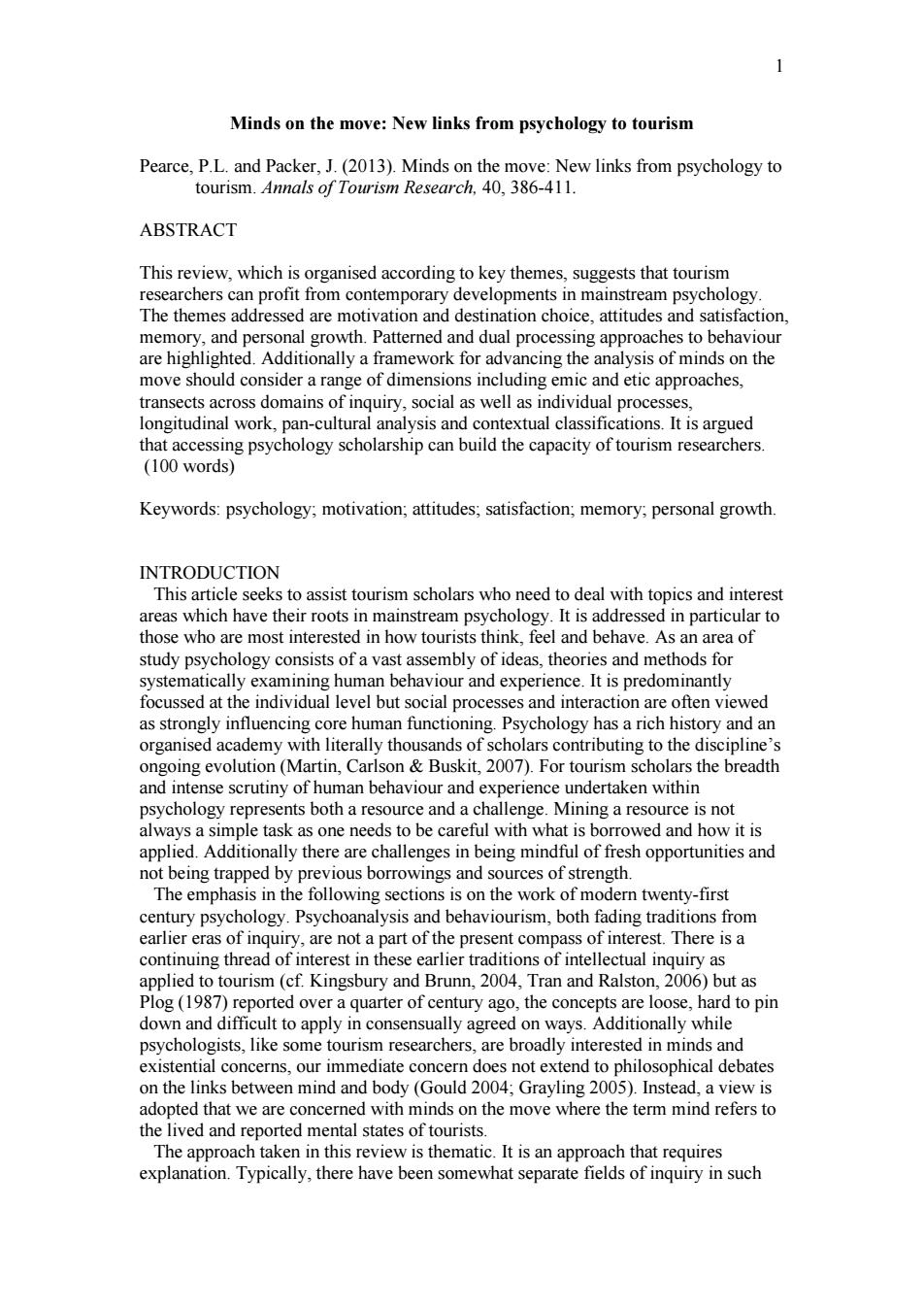正在加载图片...

1 Minds on the move:New links from psychology to tourism Pearce,P.L.and Packer,J.(2013).Minds on the move:New links from psychology to tourism.Annals of Tourism Research,40,386-411. ABSTRACT This review,which is organised according to key themes,suggests that tourism researchers can profit from contemporary developments in mainstream psychology The themes addressed are motivation and destination choice,attitudes and satisfaction, memory,and personal growth.Patterned and dual processing approaches to behaviour are highlighted.Additionally a framework for advancing the analysis of minds on the move should consider a range of dimensions including emic and etic approaches, transects across domains of inquiry,social as well as individual processes, longitudinal work,pan-cultural analysis and contextual classifications.It is argued that accessing psychology scholarship can build the capacity of tourism researchers. (100 words) Keywords:psychology;motivation;attitudes;satisfaction;memory;personal growth INTRODUCTION This article seeks to assist tourism scholars who need to deal with topics and interest areas which have their roots in mainstream psychology.It is addressed in particular to those who are most interested in how tourists think,feel and behave.As an area of study psychology consists of a vast assembly of ideas,theories and methods for systematically examining human behaviour and experience.It is predominantly focussed at the individual level but social processes and interaction are often viewed as strongly influencing core human functioning.Psychology has a rich history and an organised academy with literally thousands of scholars contributing to the discipline's ongoing evolution(Martin,Carlson Buskit,2007).For tourism scholars the breadth and intense scrutiny of human behaviour and experience undertaken within psychology represents both a resource and a challenge.Mining a resource is not always a simple task as one needs to be careful with what is borrowed and how it is applied.Additionally there are challenges in being mindful of fresh opportunities and not being trapped by previous borrowings and sources of strength. The emphasis in the following sections is on the work of modern twenty-first century psychology.Psychoanalysis and behaviourism,both fading traditions from earlier eras of inquiry,are not a part of the present compass of interest.There is a continuing thread of interest in these earlier traditions of intellectual inquiry as applied to tourism(cf.Kingsbury and Brunn,2004,Tran and Ralston,2006)but as Plog(1987)reported over a quarter of century ago,the concepts are loose,hard to pin down and difficult to apply in consensually agreed on ways.Additionally while psychologists,like some tourism researchers,are broadly interested in minds and existential concerns,our immediate concern does not extend to philosophical debates on the links between mind and body (Gould 2004;Grayling 2005).Instead,a view is adopted that we are concerned with minds on the move where the term mind refers to the lived and reported mental states of tourists. The approach taken in this review is thematic.It is an approach that requires explanation.Typically,there have been somewhat separate fields of inquiry in such1 Minds on the move: New links from psychology to tourism Pearce, P.L. and Packer, J. (2013). Minds on the move: New links from psychology to tourism. Annals of Tourism Research, 40, 386-411. ABSTRACT This review, which is organised according to key themes, suggests that tourism researchers can profit from contemporary developments in mainstream psychology. The themes addressed are motivation and destination choice, attitudes and satisfaction, memory, and personal growth. Patterned and dual processing approaches to behaviour are highlighted. Additionally a framework for advancing the analysis of minds on the move should consider a range of dimensions including emic and etic approaches, transects across domains of inquiry, social as well as individual processes, longitudinal work, pan-cultural analysis and contextual classifications. It is argued that accessing psychology scholarship can build the capacity of tourism researchers. (100 words) Keywords: psychology; motivation; attitudes; satisfaction; memory; personal growth. INTRODUCTION This article seeks to assist tourism scholars who need to deal with topics and interest areas which have their roots in mainstream psychology. It is addressed in particular to those who are most interested in how tourists think, feel and behave. As an area of study psychology consists of a vast assembly of ideas, theories and methods for systematically examining human behaviour and experience. It is predominantly focussed at the individual level but social processes and interaction are often viewed as strongly influencing core human functioning. Psychology has a rich history and an organised academy with literally thousands of scholars contributing to the discipline’s ongoing evolution (Martin, Carlson & Buskit, 2007). For tourism scholars the breadth and intense scrutiny of human behaviour and experience undertaken within psychology represents both a resource and a challenge. Mining a resource is not always a simple task as one needs to be careful with what is borrowed and how it is applied. Additionally there are challenges in being mindful of fresh opportunities and not being trapped by previous borrowings and sources of strength. The emphasis in the following sections is on the work of modern twenty-first century psychology. Psychoanalysis and behaviourism, both fading traditions from earlier eras of inquiry, are not a part of the present compass of interest. There is a continuing thread of interest in these earlier traditions of intellectual inquiry as applied to tourism (cf. Kingsbury and Brunn, 2004, Tran and Ralston, 2006) but as Plog (1987) reported over a quarter of century ago, the concepts are loose, hard to pin down and difficult to apply in consensually agreed on ways. Additionally while psychologists, like some tourism researchers, are broadly interested in minds and existential concerns, our immediate concern does not extend to philosophical debates on the links between mind and body (Gould 2004; Grayling 2005). Instead, a view is adopted that we are concerned with minds on the move where the term mind refers to the lived and reported mental states of tourists. The approach taken in this review is thematic. It is an approach that requires explanation. Typically, there have been somewhat separate fields of inquiry in such